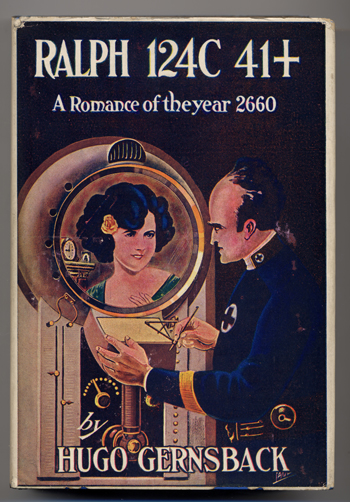 Publishing’s most legendary svengali wrote this work of science fiction in 1911. Is it a good? No. Is it “so bad it’s good”? No. Is it interesting from a historical perspective? Yes.
Publishing’s most legendary svengali wrote this work of science fiction in 1911. Is it a good? No. Is it “so bad it’s good”? No. Is it interesting from a historical perspective? Yes.
The story could be reduced to a boring paragraph, and an (only vaguely) interesting sentence: Ralph (a brilliant inventor) must rescue a charming moll from the clutches of a Martian. The book sometimes has the subtitle “A Romance of the Year 2660”, which is more fitting, because the it’s actually the year 2660 that’s the star, not Ralph. We get taken from place to place, Gernsback showing us all sorts of fancy toys and tricks, while the plot dodders along behind like a guest that isn’t sure he’s wanted at a party.
Science fiction vide Jules Verne (and Mary Shelley) uses futuristic technology to reveal truths about the human condition. Science fiction vide HG Wells uses futuristic technology to reveal truths about society and its ordering. Science fiction vide Gernsback uses futuristic technology to reveal truths about…futuristic technology.
He shows us “telephots” (video phones), but the conversations held over them are all trivial. There’s entire newspapers held on a single sheet of paper (you view different “pages” by exposing the sheet to different lights), and tube tunnels that take you right through the center of the earth, and gyroscopes that take you to Mars, and many other things, all described with breathless, autistic zeal.
But there’s a old-fashioned quality to Gernsback’s futurism. One of the arguments brought up against alien abductions is that descriptions of alien spacecraft always seem to track mankind’s cultural aesthetics (fifty years ago the interiors were all paneled wood and bakelite, now they look like something from the X Files), and Ralph 124C 41+ is like that. A futuristic society where you still have a manservant to bring you breakfast.
Despite the clever and evocative title, (“One to forsee for many”), the prose is very bad. Dangling participles scream from the pages. Gernsback doesn’t use many commas, and untangling his clauses is a constant headacge. This aside, the book has a graceless way of just…telling you stuff. Blurting it out. Here’s where we meet Ralph:
“He yawned and stretched himself to his full height, revealing a physique much larger than that of the average man of his times and approaching that of the huge Martians. His physical superiority, however, was as nothing compared to his gigantic mind. He was Ralph 124C 41 +, one of the greatest living scientists and one of the ten men on the whole planet Earth permitted to use the Plus sign after his name.”
A modern writer would communicate this by indirect means (perhaps Ralph has to stoop to get through the doorway after coming home from an award ceremony). Gernsback just cuts right too it. “Meet Ralph, he’s big, he’s smart.” Gernsback was a man of technical inclination, a builder of wireless radios and many other thiings (Ralph 124C41+ was first serialised in an electronics magazine), and he might have not seen the point of “show, don’t tell”. An electrical manual must provide exact specifications of capacitance and resistance, not just a demonstration of the device in action, and he probably took the same lesson to his fiction. He didn’t realise that fiction doesn’t traffic in information, it traffics in experience, and it’s hard to get any experience from overly-literal descriptions beyond “online dating profile.”
I was bored, and didn’t finish it. I guess this is the closest you can get to being ripped off by Gernsback in 2016, so that’s something. It’s like a cultural experience where you visit a reconstructed medieval village and they put you in the stocks for a few seconds or something. The book tries to take you to the future, but the lanes are crossed, and you end up stuck in the past.

As the 90s increased in integers, you began to hear about “shareware”: a new game distribution model enabled by the internet.
Instead of purchasing a $60.00 box of air and praying the game was as good as it looked in Nintendo Power, you actually got to play the fucker before you bought it. Imagine that. Next thing, you were up all night, watching DOOM1_1.zip dribble down your dad’s 2400 baud modem.
For me, the best part of any gaming industry shakeup (whether it’s the internet, the dedicated graphics card, the CD drive, or just shifting tastes of game-buyers) is playing all the weird crap that is momentarily allowed to market. Apogee was emboldened by shareware to release a lot of odd titles – you got the sense that they were experimenting, seeing what would stick – and although Hocus Pocus isn’t that weird, it’s still not something that would otherwise get a big-boy distribution push.
Like many Apogee titles, it was a new IP created by an outsider (Mike Voss) who had little prior history in the gaming industry. Hocus Pocus is a side-scrolling platform game about a wizard who collects crystal balls. The gameplay is similar to a previous Voss game called Clyde’s Adventure, although Clyde has 16-color EGA and Hocus has 256-color VGA. You flip switches, ride elevators, fight enemies, and dodge intellectual property suits from Sega and Nintendo. The graphics are colorful, glossy and shiny, like someone sprayed the whole game with WD-40. The monsters and environments are visually creative.
Animation is a mixed bag. Some enemies have fluid movement, but your main character is a department store mannequin. Certain characters (like the wizard Terexin) have no animation cycles at all. Ditto for the audio in general. The music is half good, half unlistenable. The PEW PEW PEW of Hocus firing his magic spell drove me to muting my audio.
I played the shareware version of this quite a bit when I was five. I could still probably draw a map of the first nine levels from memory. When I revisit Hocus Pocus now, I like it less. It’s playable but there’s not much too it.
Various things grate at me. The game has basically three enemies with different graphics. The gameplay never varies. There’s the sense that you’re playing the same level over and over. Switch combination puzzles suck. The “jokes” sprinkled throughout aren’t very funny. Any serious platformer from 1994 stomps Hocus Pocus from the top rope – games like Jazz Jackrabbit, Earthworm Jim, Megaman 6, Donkey Kong Country…
I never bothered with the full version. Shareware had a dark side – usually the paid version was just the free version + some more levels + maybe a new weapon or something. Very few Apogee titles were worth getting in full (Raptor being a notable exception); in some ways, Apogee made arcade games for the PC. Remember how Mortal Kombat would always leave you wanting more at the arcades but as soon as you got it for a home console you’d be sick of it in five minutes. Same story here. Some games are best left at small doses.
As far as I know it works on Dosbox if you play without audio (no great loss). As was their policy, Apogee magnanimously allowed developers to retain the copyright on their IPs, and so Voss theoretically could have started a Hocus Pocus burger chain or something. He didn’t.
 There’s a pianist joke that goes something like “When [butt of joke] started to play, Steinway himself came down personally and rubbed his name off the piano.” Some works would are improved by an attachment to their creator, others degraded. Thomas Pynchon and JD Salinger are/were notorious recluses who feel/felt that nothing about them should reach the wider world, except their books. This might be the polar opposite, a boos that’s almost worthless on its own merits, but gains a degree of interest through its connection to Kathy Acker.
There’s a pianist joke that goes something like “When [butt of joke] started to play, Steinway himself came down personally and rubbed his name off the piano.” Some works would are improved by an attachment to their creator, others degraded. Thomas Pynchon and JD Salinger are/were notorious recluses who feel/felt that nothing about them should reach the wider world, except their books. This might be the polar opposite, a boos that’s almost worthless on its own merits, but gains a degree of interest through its connection to Kathy Acker.
In short, it’s the story of the author going to Haiti and having sex with several people there. I don’t know if it’s autobiographical, or intended as a riff on Cole Porter’s “Katie Goes to Haiti” (I suspect the latter).
It’s easier to say what it isn’t than what it is. It’s not experimental, and not particularly Burroughs inspired. There’s no cut-up prose. There’s sexual content, but no violence. It’s short but still overlong, with many pages detailing Kathy’s transport and lodging arrangements, as well as uneventful conversations with natives.
Kathy’s descriptions of carnal knowledge read like stereotypical male pornography. No “and then our HEARTS became as ONE”, just hyperbolic and florid descriptions of erogenous zones grinding. Towards the end, she abandons the “sexcation” angle and strays into political and social commentary.
If this wasn’t written by Acker, it would probably be instantly forgettable. But coming from one of the most notorious and difficult Beat Generation artists, you’d start to speculate on the whys and the wherefores. In other words, Acker’s name was a treasure map, so I was inspired to dig in barren soil.
The boring longeurs might be a parody of holiday writing (sun-kissed people giving you the blow-by-blow real estate dossier of their hotel suite, under the impression that this is as interesting to you as it is to them.) The male-oriented pornography might be a statement on…something. Cameras as phallic objects. Male gaze.
The political angle at the end is the most interesting, particularly in contrast. At the start, everyone she meets is happy, welcoming her with open arms and open legs. On the strength of her first few hours, Haiti is paradise on earth. But the further Kathy strays from the main tourist towns, she encounters other things: poverty, disaffection, and fear. Don’t forget, this book was written during the auspice of Papa Doc and Baby Doc. I heard someone say “Minnesota Nice is when you wait until someone’s left the room until you backtalk them.” Likewise, I’ve always thought that extreme, showy openness of much of the third world is often a mask for something.
It’s not much of a book no matter how you judge it, but it’s interesting. The Beat Generation was like Monty Python: most of their juice comes from surprise, and their defiance of convention. Here’s the ultimate and most cynical execution of that: a book that’s almost completely normal. Probably hard to find, but the things Acker wrote about aren’t. In fact, they’ve probably become even more common since her day, for better or for worse.
 Publishing’s most legendary svengali wrote this work of science fiction in 1911. Is it a good? No. Is it “so bad it’s good”? No. Is it interesting from a historical perspective? Yes.
Publishing’s most legendary svengali wrote this work of science fiction in 1911. Is it a good? No. Is it “so bad it’s good”? No. Is it interesting from a historical perspective? Yes.

